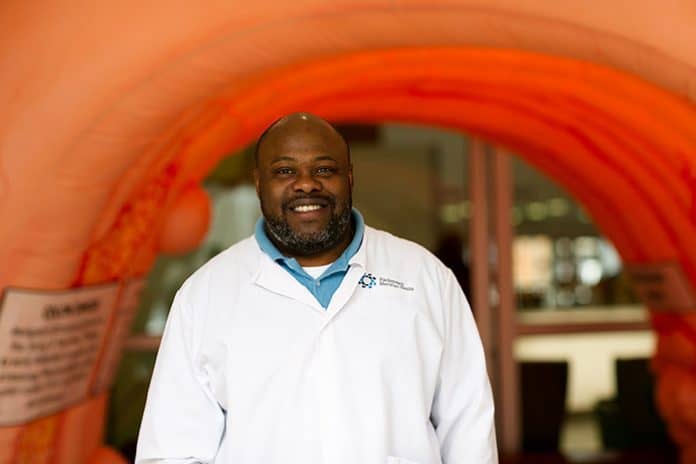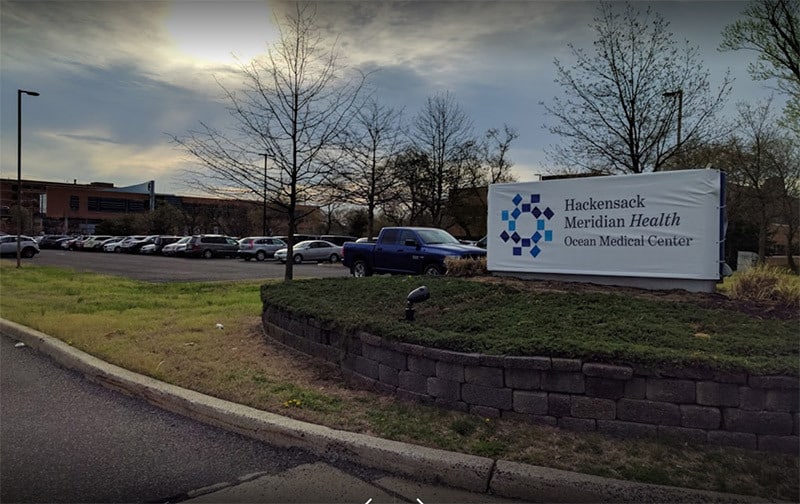
BRICK – March was Colorectal Cancer Awareness Month.
Ocean Medical Center, part of Hackensack Meridian Health, hosted its own colorectal cancer awareness afternoon March 28, which featured a 12-foot inflatable colon highlighting the different growths that can turn into cancer if left untreated. Registered participants were given colorectal take-home kits, to collect stool samples at home and mail back the slides to screen for blood or other abnormalities.
Statistics suggest 1 in 25 Americans will develop colon or rectal cancer. If caught early, the survival rate exceeds 75 percent. But as with other cancers, colorectal cancer is a silent killer, only showing symptoms – pain, rectal bleeding – in its most advanced stages.
Those with no family history of colon cancer should start screening at age 50, and if no problems are found, have a colonoscopy every 10 years. Those with Crohn’s or ulcerative colitis need to start earlier and be screened more frequently. Anyone with an immediate family member who has had colon cancer should start screening sooner. If their relative died at age 46 from the cancer, they should have their first screening at age 36.
Leonard Thomas Sr.’s mother died at 46. He had his first screening – which came back normal – at 37. He’s the senior community outreach coordinator at Meridian Health. He was manning the walk-through colon outside Ocean Medical Center’s main entrance.
“The best way to explain it is, every polyp doesn’t become cancer, but every cancer came from a polyp,” Thomas said. “So at the end of the day, when you remove a polyp, you are actually preventing cancer, and it’s one of the very few screenings that can actually prevent cancer when you get a colonoscopy.”
Tens of thousands of deaths can be prevented by getting regularly screened, Thomas said. The colorectal kits are one way to screen, and should be done annually. A sigmoidoscopy, which can be done at the done at the doctor’s office with minimal prep, should be done every five years. However, it only views the lower colon and rectum, and won’t detect any polyps in the entire colon. If pre-cancerous polyps are found, the patient will need a colonoscopy anyway.
The third screening is a colonoscopy, which requires unpleasant prep (ask anyone who’s had a colonoscopy before), time off from work, a driver to take the patient home, and sedation. The procedure is costly, but is considered the “gold standard” of screenings for cancer.
“You decrease the mortality rate if you get any one of those tests done regularly,” Thomas said. “And the best test is the one that a patient will do. So yes, the gold standard is a colonoscopy—it does up one side and down the other and gets everything – but there are a lot of people who won’t do the prep, don’t want to take the day off.”
The lecture featured Thomas R. Lake III, M.D., of Atlantic Surgical Group, and Michael J. Levitt M.D., of Atlantic Hematology Oncology Associates.
“As a surgeon, I’ve seen a lot of patients who, their primary care physician said, ‘You’re 70 years old, you’re healthy, you don’t need another colonoscopy. I think that’s bad advice. You’re 70, and now you’re 80, and now you’re 90, and you’ve reached that age for a reason. You’re healthy, and you’ve done things right. And then what happens, it sneaks up on you, and now you’re 90 and you’ve got colon cancer.”
Lake has a patient at Ocean Medical Center who is 90 and active, who was told she didn’t need any more colonoscopies. At 89, she started “having problems.” She finally had a colonoscopy, which revealed two colon cancers.
Healthy people should continue to get screened. Women should regularly get pap smears and mammograms. Men should have prostate exams. Everyone should have their colon checked.

Levitt sees patients with colon and other cancers.
“I encourage screening,” Levitt said. He reiterated that colonoscopies are the “gold standard,” and regular screening should begin at 50 unless a family member has had colon cancer.
Lake said colon cancer is no longer a geriatric problem. He has seen patients as young as their 20s with colon cancer. They are not being screened, but coming in with symptoms. The patients often don’t have a family history of colon cancer, and Lake isn’t seeing commonalities in the younger patients with cancer. Only 15 percent of colon cancers are hereditary; the other 85 percent are described as “sporadic.”
“I’ve scratched my head, saying how did you get this? There’s no family history,” Lake said.
While we can’t yet escape our genetics, the American diet likely plays a large role in cancer development. A diet of whole grains and fiber and plant-based foods, as well as reducing or eliminating red meat and alcohol, is thought to reduce the chances of developing colorectal cancer.
Lake offered his own observations from a family vacation to South Africa last summer. Traveling through South Africa, and even Europe at other times, was eye-opening for him.
“I was amazed. I was going through the grocery store. The whole grocery store was organic. You had to search out the garbage. In our food supply, you have to search out the healthy food. Everything has got GMOs, there’s hormones. I think it has a lot to do with [developing cancer],” Lake said. “Do I eat GMO-free? No. But we’re seeing at a younger and younger age and I think a lot of it is environmental. It’s the food we eat, the water we drink, the chemicals we’re exposed to in daily life.”
Organic and unprocessed food is the norm throughout much of the world. It’s often cheaper to feed a family processed food than it is to shop at a higher-end store for fresh organic foods.
Lake encourages his own patients to eat as many fresh vegetables as their budgets allow.






